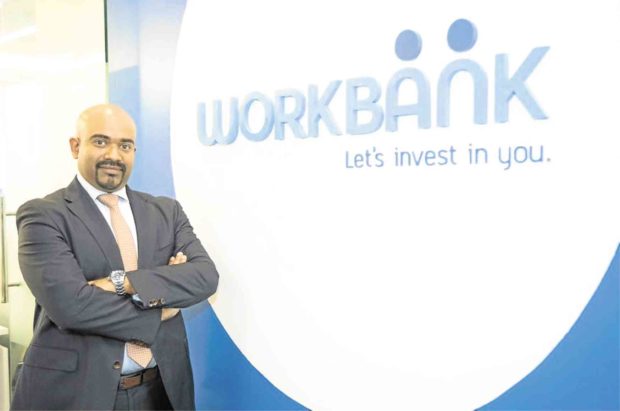Workbank is a matchmaker.—but it is not for the lovelorn looking for a soulmate.
What the very young company—it opened only last quarter of 2018—is doing is pairing up jobseekers and employers, matching one side’s skills and training with what the other seeks.
It matches talent and skills from its roster with actual demand.
It “banks” job aspirants and make them available to those looking for their specific training and/or education, expertise and experience.
That may make Workbank sound like the usual recruitment/placement agency.
But, unlike a typical employment agency, Workbank does not charge job seekers fees for the privilege and convenience of being included on its roster of talents and skills.
As explained by Reggie Fernandes, Workbank country head, the company is a talent pool where job seekers can throw in their credentials.
Headhunters can access the pool and choose the people they want and/or need by buying software that may be custom-made for their specific requirements.
The software may be programmed for just a few months, a year or longer, depending on a company’s actual needs.
For job seekers, particularly new entrants in the labor market, the setup reduces waste of time, effort and money.
Instead of scouring want ads every day, or going from office to office searching for a vacancy, they can just wait for their match to pick them.
Of course, they can still do the traditional way if they want, even if they join the “bank.”
While labor laws set the minimum age at 18, Fernandes says people of any age can join the “bank.”
They may include those wanting something better than what they are doing now, people who simply want or need a change.
They can also specify if they want full-time or part-time employment, Fernandes says.
Workbank may even be able to help those who are only looking for opportunities for internship. Partners may also help provide additional training to enhance an applicant’s employability.
Workbank finds ways to help job seekers deliver their best and increase their chances of being employed.
“Our number one commitment is to invest in our talents so that they can land the jobs they aspire for. Finding likeminded partners who can help us see this into fruition is what we will consistently try to build on,” Fernandes says.
Workbank has partnered with Grab, the transport network vehicle service, which gives applicants fare discounts when they go for their job interviews. Zalora offers discounts on clothes that may help applicants land the job they want.
Fernandes says the trailblazing concept is founded on the Filipino virtue of “malasakit,” which can mean care, concern or compassion. Malasakit is the driving force in the decision of Jaison Francis, Workbank cofounder and chair, to launch his brainchild in the Philippines.
Francis has had a long-standing relationship with Filipinos as a recruiter of foreign workers and, because of his generally positive experience dealing with them, he wants to do more for them. “Workbank doesn’t just connect job seekers and recruiters —it also provides guidance and support for interviews, pre-employment requirements and assistance even during their first month of work,” Francis says.
Just as Workbank helps shorten the process of being hired for applicants, Fernandes says recruiters’ jobs are also made easier. Using Workbank’s software, they can do a digital search, narrowing or widening their focus depending on their requirements. They would not have to see so many people to find the one person that meets their criteria.
Workbank does not expect to replace human resource (HR) departments but simply help simplify and shorten the selection process so they can concentrate on more pressing issues.
Since information technology is the “foundation” of the business, almost half of Workbank’s current staff are IT people “who implement ideas,” Fernandes says.
Job seekers who want to join Workbank’s pool of talent for free can visit its website.—CONTRIBUTED
